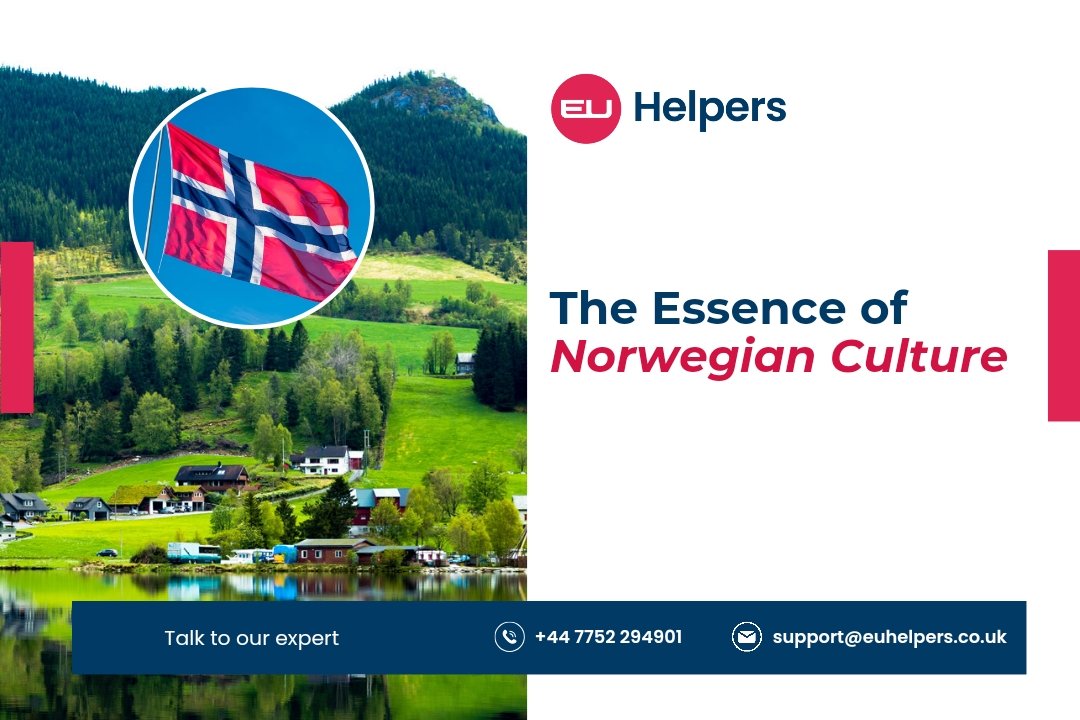
Exploring Norwegian Culture – guide by EU helpers
Norway is a country of breath-taking glaciers, fjords, and avid winter sport enthusiasts. The
terrain is glaciated with mostly high plateaus and rugged mountains broken by fertile valleys,
scattered plains, coastline deeply indented by fjords, and arctic tundra in north. During the
warmer months, Norwegians of all ages love to be outside and hike, fish, and barbecue. In
the colder months, some travellers are lucky enough to catch a glimpse of the spectacular
Aurora Borealis (The Northern Lights). Norwegians tend to have a strong sense of history
and civic engagement and on special occasions, many Norwegians wearing traditional
clothing, or bunad. In Norwegian culture, some of the most important values are tolerance,
respect and equality.
Norwegian People and Community
Family Dynamic
Norwegian families tend to be small, but relatives often live in the same town. For most
Norwegian parents, it’s important that their children grow independent, and take
responsibility for their own activities and actions. One key principle in Norwegian culture is
egalitarianism (that we are all equal). This is reflected in gender relations, age relations and
how people address others. Norwegians always address people by their first names, even
teachers and elders. Norwegians dress and act informally, and treat each other with the
sense of equality, no matter differences in economic class, gender or status. Men and
women are considered equal. That means it is expected that they do the same kind of jobs,
work just as much, earn the same amount of money, have a shared responsibility in the
house and have a shared responsibility for the upbringing of their children.
Teenage Life
Young people in Norway are often involved in after-school activities such as sports, music,
arts, and crafts. Community organized activities, scouting, politics clubs, and the Red Cross
are also quite popular. And like most teens everywhere, weekends are for movies, parties,
or hanging out at cafes.
Norwegian teenagers are expected to employ themselves during their spare time. Many
young people take part in organized activities like sports, political organizations, and
volunteer work. It is common that boys and girls are good friends without being a couple.
Boys and girls are equals when it comes to rights and duties in Norway.
Holidays in Norway
Since Norway historically is a Christian-Lutheran country, the constitution states that the
Norwegian culture and laws should reflect Christian-Lutheran values and humanitarian
principles. The Christian traditions are also reflected in national holidays like Christmas and
Easter.
Language and Communication Styles
Communication Style
At first, Norwegians may seem shy. They are reserved people, and it can take some time for
them to get comfortable around new people and new settings. After some time, they will
open up and show a big warm heart.
Bragging about oneself and one’s skills is usually seen as negative in Norwegian culture,
since people are not supposed to see themselves as superior to others. This mindset is
called “janteloven”, and even though it is joked about, it is not entirely false. Norwegians are
modest people. Honesty and politeness are core values, and people expect each other to ask
nicely if they want something. On the other side, Norwegians tend to talk to each other in a
very direct way and appreciate honest and straight forward communication. Not many
subjects are taboo, and it’s usually okay to speak about anything.
In Norwegian culture, there tends to be a strict separation between what’s theirs and what’s
yours. Sharing personal belongings is not so common.
Official Language of Norway
Norwegian is the language of Norway. It is a Germanic language related to Danish, Swedish
and Icelandic and has two official forms of writing—Bokmål (Standard Norwegian)
and Nynorsk (New Norwegian).
Food in Norway
The Norwegian Diet
Norwegian food is usually a mix of traditional and international cuisine. One of the most
popular foods in Norway is fish, but people also eat lots of meat, potatoes, vegetables, milk
and cheese, and there are various sweets. Open-faced sandwiches are also popular and are
often eaten for breakfast. Dinner is the main meal of the day and a favorite dish is meatballs
and potatoes with gravy. Even though Norwegians still appreciate traditional Norwegian
dishes, the international cuisine has had a lot of influence the recent decades. “Tacos” for
example, are a very typical dish some families will eat during the weekend, quite different
from Mexican tacos! The same works for pizzas and pasta. Norwegians eat bread at least
two times a day, and sometimes even three times. Breakfast and lunch are usually made up
of bread. Most Norwegians will not have any hot meals before dinner.
More information regarding study, work or even visa related stuff can be found through EU
helpers official website or you may consult our team through our enquiry portal.
